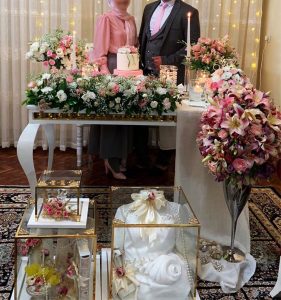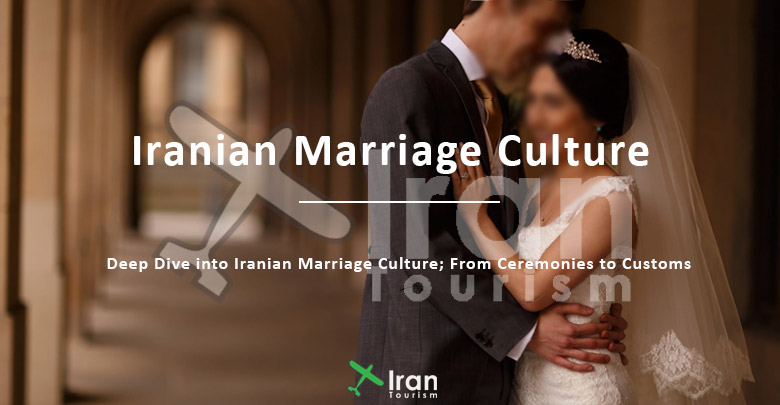The Iranian marriage culture is respected among Iranians, and each of the rituals they perform to make it more glorious has a philosophy that promotes a culture of simple marriage with adherence to beliefs and religions among young people.
The history of some Iranian wedding traditions goes back to prehistoric times. Some Iranian marriage laws are common in the culture of many world nations.
The exchange of wedding rings, the dowry, and endowment, the giving of flowers, wedding parties, music, and holy books such as the Qur’an exist in the culture of different nations in different forms and with various details.
Wedding parties in Iran involve all tribes and families and perform wedding formalities with each other, such as traditional dances and singing songs, which make a wedding ceremony more glorious.
This article will familiarize you with Iranian marriage culture along with Iran Travel Guide Center.
Step by Step, Marriage in Iran Based on Iranian Traditions
Wedding parties in Iran is a ceremony that announces the beginning of the official life of two people. Wedding ceremonies in every country and region have had special customs since ancient times.
Iranian marriage laws and traditions are so exciting, which we will introduce in the following:
In this article from the Iran travel guide center, we will briefly introduce the stages of marriage in Iran, from the Marriage proposal to Honeymoon.
The variety of Iranian marriage culture in different cities is wide, so we will discuss the ceremonies generally held in most parts of Iran in this article.
You know that these days few of the people committed to these old Iranian traditions still hold these ceremonies. However, the new generation only has one wedding ceremony.
Stages of Marriage in Iran
-
Marriage Proposal (Khastegari)
For a successful marriage, both parties must know each other very well. A Khastegari session in Iranian marriage culture allows a girl and a boy to talk for a while and get to know each other’s moods.
In the Khastegari session, several people usually go to the bride’s house on behalf of the groom’s family to see her up close.
They serve the groom’s family with Iranian tea and answer their questions. After tea, if the groom’s family likes the girl, they start talking about the main issue of the marriage.
Otherwise, after a while, they leave the party. At the end of the session, if the girl and the boy like each other, a gift is given to the bride.
-
Bale Boran (Proposal Answer)
 After the Khastegari session, a Bale Boran is organized. In this ceremony, the family elders gather together, and the final talks are held about the bride’s dowry and the terms of the marriage. At the Bale Boran ceremony, the groom’s family brings gifts to the bride and accepts her as their son’s fiancé.
After the Khastegari session, a Bale Boran is organized. In this ceremony, the family elders gather together, and the final talks are held about the bride’s dowry and the terms of the marriage. At the Bale Boran ceremony, the groom’s family brings gifts to the bride and accepts her as their son’s fiancé.
In most cities, a piece of cloth, a ring, and sometimes a Sugarloaf are given to the bride and her family as a token of congratulations and sweets.
-
Aghd or Nikah (Wedding vows)
The wedding table is one of the traditional Iranian tables prepared at the wedding ceremony, and the bride and groom sit beside it and listen to the wedding sermon. The khutbah aghd (wedding sermon) is recited in the presence of the family elders, after which the rings are exchanged, and honey is eaten. Afterward, guests close to the family present the bride and groom with jewelry and gold coins.
Wedding parties in Iran are one of the parts of the marriage process in Iran. Like other nations’ weddings, modern wedding parties in Iran can be held at home, in a restaurant, or in a banquet hall, including dinner, cake, music, dance, and special Iranian customs.
At this party, the bride and groom invite their family and friends and celebrate their marriage. Wedding parties in Iran are often held with pop music. At the night’s end, the bride and groom leave for their home and begin their lives in their house.
Like many other nations, the Honeymoon is one of the marriage customs in Iran. After the wedding celebration, the bride and groom go on a trip for their Honeymoon.
-
Pagosha (First Formal Invitation)
Pagosa is a tradition in which relatives invite the newly-married couple to their house shortly after the wedding. It means that relatives accept the groom and bride as an independent family.
Iranian Marriage Laws
Iranian marriage laws include some terms of marriage that enter the marriage contract with the spouses’ agreement. These conditions can be mentioned in the official marriage document and signed by both parties.




No comment